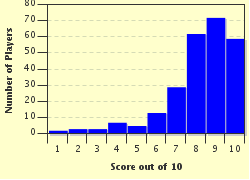Quiz Answer Key and Fun Facts
1. Before getting into the eras proper, we'll go right back to the very beginning. Mankind has always been fascinated with the rhythm and beat of music, with the very first rhythm markers being the voice, stamping of feet and clapping of hands. What comprised the materials from which the first "manufactured" instruments were made?
2. The Bible is an excellent source of musical history because of the time period it spans right up to the beginning of the New Testament. There are many, many verses which sing out man's love of music - and equally as many naming the various instruments used. Which great biblical king was particularly fond of music and song, and is believed to be the author of some of the psalms?
3. Music and speech go together. Which civilisation is given credit for inventing writing in general, and for writing down the first musical notation?
4. The next general period of music, known as "Early Music" for want of another term, spanned the period roughly from the beginning of the common era to the onset of the medieval era in the fifth century, AD. Music had grown by leaps and bounds before this era began, but began slowing down in its development mid way through this time period. Why was this?
5. The Medieval Era of music spanned a time period from circa 500 to the end of the 15th century. What name do we give to the plainsong melodies of the early Medieval church?
6. The Renaissance Era covered the period from approximately the beginning of the 15th century till the close of the 16th. It proved a giant leap forward in the history of music. Which discovery in particular gave impetus to the development of Renaissance music?
7. So, onto the Baroque era in music. Three composers, more than any others, symbolise this period in the history of music. One was Antonio Vivaldi, and one was George Frideric Handel. Who was the third?
8. The lovely era of Classical music followed the Baroque, and went from 1750 to approximately 1830. Which enormous musical talent symbolised this era?
9. Where the Classical era saw the great leap forward in the performance in its own right, the Romantic era in music looked backward to a degree to the voice - and exquisite and breathtaking songs were the result. Which German composer of this era in particular gave the world an astonishing output of over 600 lieder in his short lifetime?
10. This takes us then to the era of modern and post-modern music - that produced during the 20th century and beyond. Which great Modern era composer, then, kicked off the 20th century with his magnificent opera, "Tosca"?
Source: Author
Creedy
This quiz was reviewed by FunTrivia editor
ertrum before going online.
Any errors found in FunTrivia content are routinely corrected through our feedback system.

